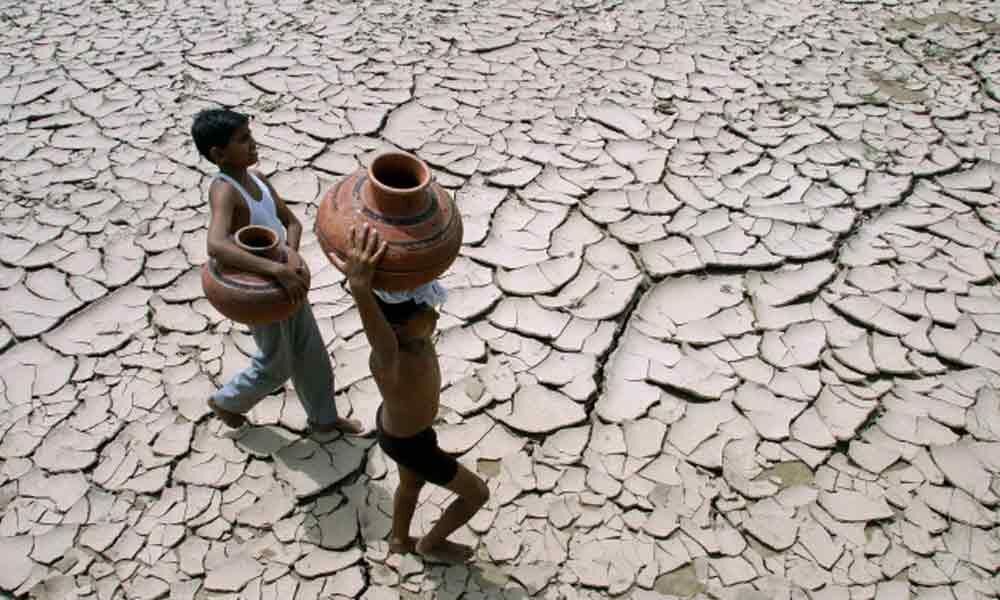Live
- 15 Years of Transformation: Oakridge International School, Bachupally Celebrates Founder's Day
- Takshasila celebrates annual day
- 3 months after opening, Morampudi Flyover remains incomplete
- Skill enhancement session organised for school teachers
- Tribal Ashram school girl students fall sick again
- Grand finale of Innovation marathon begins at IIT Tirupati
- Ensure no inconvenience to bus passengers: MLA
- Being overweight surpasses smoking as Australia's leading health risk
- Rush of Devotees at Tirumala normal, to take six hours for darshans
- Thiruvannamalai turns a major revenue earner for RTC
Just In
Monsoon deficiency comes down to 33% in June


Groundwater level in 16% taluks, mandals and blocks in over-exploited category: Data
New Delhi: June ended with 33 per cent of monsoon precipitation and over 78 per cent of meteorological subdivision recording "deficient" rainfall, according to the India Meteorological Department.
However, monsoon is likely to become active this week.
IMD's Additional Director-General Mrutyunjay Mahapatra said formation of a low pressure in the Bay of Bengal will bring good rainfall to central India, including Odisha and parts of Rajasthan.
Parts of north India like Delhi, Punjab and Haryana may not benefit due to this low pressure area and it is unlikely that these states will get rainfall because of it, Mahapatra said.
Private weather forecaster Skymet's Managing Director Jatin Singh said monsoon surge is expected from June 30 to July 15 with a short break in between.
The official monsoon season in the country starts on June 1 and ends on September 30.
As of June 30, monsoon has reached almost the entire country, except a few parts of north India. It is yet to reach Delhi, Haryana, Himachal Pradesh and Jammu and Kashmir.
Monsoon reached Kerala on June 8, a week after its normal onset date. Its progress was halted for more than a week due to Cyclone Vayu in the Arabian Sea.
Groundwater level in 16 per cent of the taluka, manadal, block level units in the country fall under the "over-exploited" category, while 4 per cent fall under the "critical" category, government data shows.
Groundwater level of the 6,584 block, mandal, tehsil level units assessed by the Central Groundwater Board reveal that 4,520 units fall under the "safe category", according to the data shared by the government in Lok Sabha last week.
As many as 1,034 units have been categorised as "over-exploited", the data states. Nearly 681 block, mandal, taluka level units in the country, constituting 10 per cent of the total figure, fall under the "semi-critical" category, while 253 fall under the "critical" category.
Nearly 1 per cent of the blocks, mandals and talukas had saline water. The figure is based on the government's 2013 assessment.
"As per the 2013 assessment, out of total 6,584 assessment units (blocks, talukas, mandals, watersheds, firkas) in the country, 1,034 units in 17 states and Union territories have been categorised as over-exploited where groundwater extraction is more than the net groundwater availability and there is significant long-term decline in water levels.
"Two hundred and fifty-three units have been categorised as critical, 681 units as semi-critical and 4,520 units as safe," the minister of state in the Jal Shakti Ministry shared the information in Parliament last week.
The over exploitation of the groundwater was highest in the states of Punjab (76 per cent) and Rajasthan (66 per cent), followed by Delhi (56 per cent) and Haryana (54 per cent).
There was no over-exploitation of groundwater reported in the states of West Bengal, Uttarakhand, Tripura, Odisha, Nagaland, Meghalaya, Mizoram, Manipur, Jammu and Kashmir, Assam, Arunachal Pradesh and Goa.
Groundwater levels in all the block, taluka, mandal level units from 12 states and Union territories — Arunachal Pradesh, Assam, Goa, Manipur, Meghalaya, Mizoram, Nagaland, Andaman and Nicobar Islands, Chandigarh, Dadra and Nagar Haveli — were reported to be in the safe category.

© 2024 Hyderabad Media House Limited/The Hans India. All rights reserved. Powered by hocalwire.com






